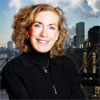Stem Cells: What These Lifelong Companions Can Teach Us About Cancer, Aging and Regenerative Medicine
| Date: |
Tuesday, October 18, 2011 |
Place: |
1230 York Avenue at 66th Street |
| Time: |
7:30 a.m. – 9:00 a.m |
|
Abby Aldrich Rockefeller Hall |
| |
|
|
The Rockefeller University |
| |
|
|
New York City |
Most of our cells are specialized to serve as muscle, nerve, blood, skin, or one of the body's many other differentiated tissues. When these cells die in the course of disease, injury, or normal cellular aging, the body issues 911 calls
that are answered by stem cells, versatile companions that reside within each tissue, with the potential to replenish specialized cells lost during normal wear and tear.
How do stem cells retain their remarkable capacity to regenerate tissue? Why are some stem cells, such as those of the skin, so extraordinarily good at making new tissue? And why are other stem cells, such as those of the heart and brain, more limited in their potential?
 These are some of the many questions that fascinate Elaine Fuchs, whose influential research on the biology of skin is clarifying the roles that stem cells play in building and regenerating tissues. Her laboratory has uncovered various molecular signals that tell skin stem cells when to make hair, when to make epidermis instead, and when to stop once an injury is repaired. By focusing on fundamental mechanisms, her work is shedding light on the mysteries of the body's
These are some of the many questions that fascinate Elaine Fuchs, whose influential research on the biology of skin is clarifying the roles that stem cells play in building and regenerating tissues. Her laboratory has uncovered various molecular signals that tell skin stem cells when to make hair, when to make epidermis instead, and when to stop once an injury is repaired. By focusing on fundamental mechanisms, her work is shedding light on the mysteries of the body's fountain of youth
cells.
Although skin stem cells typically replenish only the skin's lost or dying cells, they are closely related to others, such as stem cells of the cornea, breast, prostate, and lung. Studies by Dr. Fuchs and her collaborators have begun to reveal unforeseen opportunities for therapies involving skin stem cells for example, turning them into corneal stem cells that may be able to correct certain kinds of blindness.
Dr. Fuchs is also pursuing the theory that tumors result from stem cells gone awry, raising the possibility that scientists could intervene in this process for cancer therapy. Her investigations are elucidating the broad questions of what happens to stem cells as we grow older, and whether changes in stem cells raise the risk of cancer as we age.
An Investigator of the Howard Hughes Medical Institute, Dr. Fuchs received the National Medal of Science from President Obama in 2009. In 2011, she shared the Albany Medical Center Prize, America's largest prize in medicine. A member of the National Academy of Sciences and its Institute of Medicine, Dr. Fuchs recently served as president of the International Society for Stem Cell Research.
Marc Tessier-Lavigne, who took office as president of The Rockefeller University in March 2011, will host this event. Before joining the University, he was executive vice president for research and chief scientific officer for the biotechnology firm Genentech.
To RSVP or for more information, click here or contact Laura Votey
at (212) 327-7499 or lvotey@rockefeller.edu.